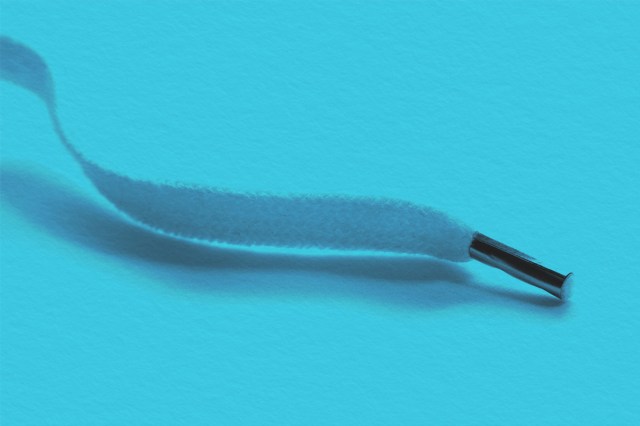
Names carry meaning — sometimes more than we realize. As Shakespeare famously wrote, “What’s in a name? That which we call a rose by any other word would smell as sweet.” Juliet may have been lamenting the weight of Romeo’s family name, but to lexicographers, her question applies to everything. Even the most ordinary objects have names with surprising histories. Asking “What’s in a name?” about everyday things — from the dots on a domino to the sleeve on your coffee cup — reveals fascinating stories that can change the way you see the world around you.
(Noun) The metal cage that holds the cork on a bottle of Champagne.
This metal contraption secures the cork on a bottle of Champagne or other types of sparkling wine. The French word isn’t likely to be found in standard English dictionaries, but it’s well known to those in the wine industry. According to Becky Sue Epstein, author of Champagne: A Global History, an early version of the muselet was crafted in 1844 by Adolphe Jacquesson (of the renowned Jacquesson Champagne house). The word aptly derives from museler, a French verb meaning “to muzzle.” The muselet is a three-piece system with a ring of wire around the bottle, additional pieces of wire stretching over the cork, and a metal plaque between the wires and the cork to prevent damage to the cork. Traditionally, the connecting wires are twisted together a precise six times to secure the cork in place when pressure builds from the sparkling beverage.
(Noun) The plain or ornamental tag covering the ends of a lace or point.
Aglets are caps at the end of shoelaces that prevent the strings of laces from fraying and allow laces to pass through eyelets with ease. While this might seem like a modern invention, the word “aglet” has been around since at least the 14th century, when the term “ageletmakere” was seen in a collection titled Middle English Occupational Terms, compiled in 1950 but dating to 1365. Back then, someone who made aglets was working with metal because plastic wouldn’t be around for approximately 500 years. The term “aglet” originates from the Old French aiguille, meaning “needle.”
(Noun) A slender, pointed projecting part.
There is a specific word for the tiny prongs of a fork: “tines.” The term is an alteration of an older English word, “tinde,” which denoted other pointy things, such as an animal’s horn or the branch of a deer’s antler. It derives from the Old Norse tindr, meaning “point” or “summit.” The earliest recorded use of “tines” (with this spelling) is from a 1554 volume of tragedies called Lydgate’s Bochas: “The fiery tines of his brennyng arow.” Since then, “tine” has been used to describe almost anything pointy, from a 16th-century arrow to the long prongs of a modern lawn rake.
(Noun) The amount that a container (such as a tank or cask) lacks of being full.
Have you ever tried to make it through the TSA line with a half-full bottle of shampoo and been turned away because the label read “5 oz.”? Of course you had less than 3 ounces of shampoo, but the TSA doesn’t account for ullage — the amount between the actual contents of a bottle and the capacity. “Ullage” was first used in Middle English in a more specific sense, pertaining to “the amount of wine or other liquor by which a cask or bottle falls short of being quite full.” The term traces back to the Old French verb ouiller, meaning “to fill up (a barrel) to the bung.” (The “bung” or “bunghole” is the hole through which a cask can be filled or emptied.) Later, the term “ullage” came to be used for the space that was not filled to the top of a bottle or cask. Interestingly, during the mid-20th century, the term acquired another specific usage: “In a rocket, the part of a fuel tank that is not occupied by fuel.”
(Noun) A small device that plugs into a computer and serves as an adapter or as a security measure to enable the use of certain software.
A dongle is a common term for any pocket-sized device that connects to a computer, typically through a USB port. This includes items such as SD card readers, Bluetooth connectors, GPS receivers, and flash drives. The term was first recorded in a 1981 edition of New Scientist magazine: “The dongle is an extra piece of memory that is plugged into the computer, without which the program refuses to run.” While the Oxford English Dictionary lists the term’s etymology as an arbitrary formation, one explanation is that it is an alteration of “dangle” due to how USB flash drives (and other dongles) jut out of computers and modems when plugged in.
(Noun) The cardboard sleeve used to carry a hot beverage.
Zarf (or zurf) is an ancient Arabic word for “vessel.” It was adopted in Levant (a region in the eastern Mediterranean) as a word for an ornamental metal holder for a coffee cup. During the 19th century, ornamental zarf became a fixture of ritualized coffee drinking in the region — the wealthy cherished their gold and diamond-encrusted zarf. In modern English, the term is catching on as a name for the cardboard sleeve on a to-go coffee cup. While a flimsy modern version may not feature precious gemstones, it serves the same purpose: to protect your hands from burns.
(Noun) One of the dots used on dice and dominoes to indicate numerical value.
Here’s a fun fact for your next game night: The dots on playing cards, dice, or dominoes are called “pips.” This usage dates to 1600, though its root is unknown. However, this definition contributes to the use of “pip” as a synonym for “fleck,” “speck,” and “dot.” Interestingly, “pip” also stands for another category of minuscule items, though this etymology apparently evolved separately and unrelated to its use in dominoes and dice. During the 18th century, “pips” emerged as a term for seeds of various fleshy fruits such as apples, oranges, and grapes. It stems from an earlier Middle English use of “pip,” meaning “apple tree” or “apple.” Using “pip” to describe fruit seeds is now rare in American English but is still common in British English and other dialects.

















